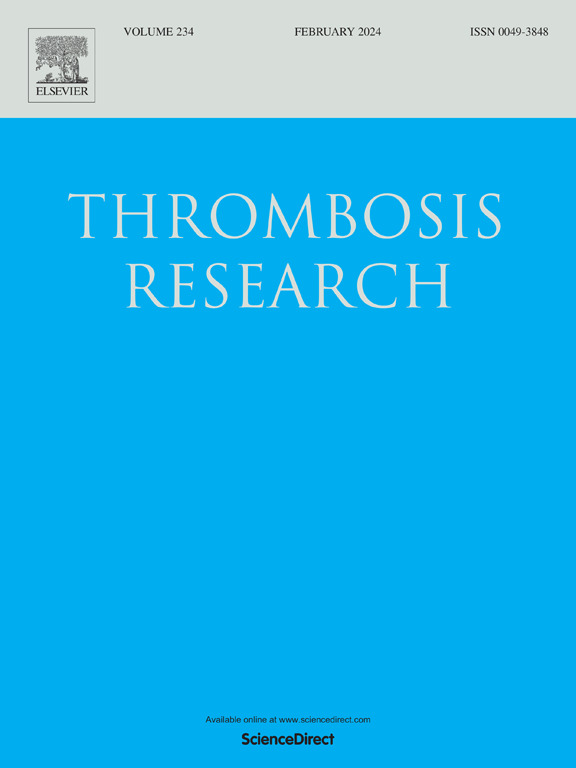Haemostatic changes detected by thromboelastography in chronic kidney disease: A systematic review and meta-analysis
IF 3.7
3区 医学
Q1 HEMATOLOGY
引用次数: 0
Abstract
Haemostasis in Chronic Kidney Disease (CKD) is complex, with patients experiencing both thrombotic and haemorrhagic risks. Current therapies, such as dialysis and blood transfusions, often rely on clinical judgment, which may not fully address these haemostatic abnormalities. This systematic review and meta-analysis aimed to determine whether Thromboelastography (TEG) offers a better ability to assess coagulation abnormalities in CKD compared to standard coagulation tests like activated partial thromboplastin time (aPTT), and prothrombin time (PT). A search across five databases identified 10 studies comparing TEG parameters in CKD patients versus healthy controls. TEG detected hypercoagulability in CKD, with significant reductions in Kinetics Time (P = 0.04), increases in Alpha angles (P = 0.02), and elevated Maximum Amplitude values (P = 0.0006). However, Reaction Time (P = 0.43) and Lysis 30 (P = 0.28) showed no significant differences. Standard coagulation tests, including aPTT and PT, also showed no significant differences between groups (P = 0.30 and P = 1.00), suggesting their limitations in detecting the complex haemostatic changes in CKD. Platelet counts were lower in CKD patients (P = 0.0009) but remained within normal ranges. Elevated fibrinogen levels (P = 0.003), linked to chronic inflammation, indicated a prothrombotic profile. Despite high heterogeneity in some parameters due to variability in CKD stages and treatment types, TEG demonstrates a more detailed assessment of haemostatic changes in CKD, suggesting its potential as a predictive tool for managing coagulation abnormalities.
慢性肾脏疾病血栓弹性成像检测的止血变化:系统回顾和荟萃分析
慢性肾脏疾病(CKD)的止血是复杂的,患者有血栓形成和出血的风险。目前的治疗方法,如透析和输血,往往依赖于临床判断,这可能不能完全解决这些止血异常。本系统综述和荟萃分析旨在确定血栓弹性成像(TEG)是否比标准凝血试验(如活化部分凝血酶活时间(aPTT)和凝血酶原时间(PT))能更好地评估CKD的凝血异常。通过对5个数据库的搜索,确定了10项比较CKD患者和健康对照组TEG参数的研究。TEG检测到CKD的高凝性,其动力学时间显著缩短(P = 0.04), Alpha角显著增加(P = 0.02),最大振幅值升高(P = 0.0006)。而反应时间(P = 0.43)和裂解时间(P = 0.28)无显著差异。包括aPTT和PT在内的标准凝血试验在两组间也无显著差异(P = 0.30和P = 1.00),提示其在检测CKD复杂的止血变化方面存在局限性。CKD患者的血小板计数较低(P = 0.0009),但仍在正常范围内。纤维蛋白原水平升高(P = 0.003)与慢性炎症有关,表明血栓形成前的特征。尽管由于CKD分期和治疗类型的差异,某些参数具有很高的异质性,但TEG对CKD的止血变化进行了更详细的评估,这表明它有可能作为治疗凝血异常的预测工具。
本文章由计算机程序翻译,如有差异,请以英文原文为准。
求助全文
约1分钟内获得全文
求助全文
来源期刊

Thrombosis research
医学-外周血管病
CiteScore
14.60
自引率
4.00%
发文量
364
审稿时长
31 days
期刊介绍:
Thrombosis Research is an international journal dedicated to the swift dissemination of new information on thrombosis, hemostasis, and vascular biology, aimed at advancing both science and clinical care. The journal publishes peer-reviewed original research, reviews, editorials, opinions, and critiques, covering both basic and clinical studies. Priority is given to research that promises novel approaches in the diagnosis, therapy, prognosis, and prevention of thrombotic and hemorrhagic diseases.
 求助内容:
求助内容: 应助结果提醒方式:
应助结果提醒方式:


